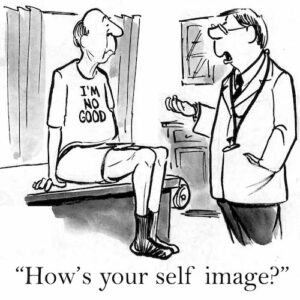
You still wrestling with the memory of that bully giving you a wedgie on the crowded playground at recess in the 4th grade*? I’m probably not your guy.
I’m not a psychologist, I didn’t play one on TV, and I didn’t sleep at a Holiday Inn Express last night. And though I have no doubt that many of my coaching interactions sometimes feel like therapy to clients, they aren’t, and my endgame is always helping execs become better leaders and better versions of themselves.
Now, with that out of the way… a reasonably common refrain among managers of all levels and ilk is this phenomenon called Imposter Syndrome. Simply put (see “I’m not a psychologist” above), it’s feeling like you’ve pulled the wool over everyone’s eyes, and that when discovered for what you really are, folks will judge you to be unworthy – an imposter who only achieved their position through sleight of hand, guile and chicanery.
Curiously, I see it frequently among those who appear most competent and successful. In other words, people who have likely proven their worth a multitude over.

Well, at least we know now why I’m no psychologist. I’d have to drive an Uber to feed myself.
But to those who face this malady, and it does sometimes seem significant to those affected, I offer a few pieces of advice:
Open your freakin’ eyes. My clients hear me frequently admonish with the question, “What’s your evidence of that?” Look, if you want to think you’re unworthy or a fraud, or believe that you haven’t actually done anything significant, I’d ask you to look around – do you not see the results of any of your efforts? Are people in your charge not better off? Are results/metrics/goals/objectives not being achieved?
They are, and those data points are what NCIS people call “evidence.” Not necessarily proof positive, but it’s in the same ballpark.
No risk, no reward. If you believe you’re a phony, and that others may sleuth around and pick up on it, you’re likely going to keep your head down, and try to stay off the radar. Lots of status quo in that world, and few leaders succeed being satisfied with status quo day-in, day-out.
There’s risk in leadership – get a helmet. If you are risk-averse because of a non-evidentiary belief, then prepare yourself; the real failure you experience won’t be nearly as imaginary.
Finally, you’re just not that clever. If you hold a reasonably senior role in an organization, do you realize how many people you have to be convinced bought your line of bullshit to reach that level? You actually think that, through your fear of being discovered, you managed to hide your incompetence, lack of delivery, and inability to provide necessary leadership to the throngs of managers and executives that promoted, mentored and supported you throughout your career to date?
Do you have any idea how crazy that sounds? “Why yes, Kevin, I completely buffaloed a Senior Director, an Ops VP and successful CEO in my meteoric – but completely baseless – ascension to this role.”
Seriously? Let me repeat – you’re just not that clever.
I understand – feeling less than fully worthy is no laughing matter (well, an occasional chuckle could be a pick-me-up); I get it. And no doubt it feels pretty real to those who experience that frustration.
But if you have no evidence of such tomfoolery, and you’ve not been cold-busted trying to do something you were obviously and completely ill-equipped to do, then cut yourself some slack.
- Thinking you’re honored with a promotion is a good thing.
- Humility in leadership is positive, and can be somewhat rare.
- Realizing others could probably do the job at least as well as you is not an unreasonable thought, even if those promoting you felt different.
But believing that observable evidence is false? That you can lead others (and functions) while burying your head in the sand? That everyone else must have been a moron or you wouldn’t be here?

You gotta admit, it does seem a bit far-fetched.
Congrats on the role/position/responsibilities. You deserve them, and I have every confidence you’ll do well.
* Now, if you were humiliated when your 2nd grade girlfriend announced she didn’t like you anymore, we can definitely work together (Thanks, Robbie, I’m still working through that trauma).

